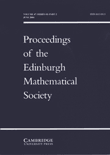
PROCEEDINGS OF THE EDINBURGH MATHEMATICAL SOCIETY
Scope & Guideline
Exploring the depths of mathematical inquiry.
Introduction
Aims and Scopes
- Algebra and Lie Theory:
Research in this area includes studies on automorphic Lie algebras, algebraic structures, and their applications, highlighting the interplay between algebra and geometry. - Functional Analysis and PDEs:
The journal publishes works on functional analysis, including operator theory and partial differential equations (PDEs), focusing on existence, uniqueness, and behavior of solutions. - Geometric Analysis and Topology:
Papers often explore topics in geometric analysis, including the study of manifolds, curvature, and other topological properties, contributing to the understanding of geometric structures. - Number Theory and Combinatorics:
The journal includes research on number theory, including congruences and partitions, reflecting a strong interest in the properties of numbers and combinatorial structures. - Mathematical Physics and Dynamical Systems:
Publications in this category cover topics related to mathematical physics, including wave equations, dynamical systems, and their mathematical formulations. - Complex Analysis and Geometry:
Research contributions focus on complex functions, analytic spaces, and their geometric implications, illustrating the deep connections between analysis and geometry. - Probabilistic Methods and Stochastic Processes:
The journal features studies involving stochastic processes, random variables, and their applications in various mathematical contexts.
Trending and Emerging
- Nonlinear Analysis and PDEs:
There is a growing trend in the publication of papers addressing nonlinear phenomena and their mathematical modeling, particularly in the context of PDEs, highlighting the relevance of these methods in various scientific fields. - Algebraic Geometry and Topological Methods:
Recent publications show an increased focus on algebraic geometry, particularly in connection with topological aspects and their applications in modern mathematical problems. - Quantum and Statistical Mechanics:
The journal reflects a rising interest in the intersection of mathematics with quantum mechanics and statistical theories, indicating a trend towards the mathematical formulation of physical concepts. - Higher-Dimensional Algebra and Homotopy Theory:
Research exploring higher-dimensional algebraic structures and their implications in homotopy theory is on the rise, suggesting a shift towards more abstract and generalized frameworks. - Interdisciplinary Applications of Mathematics:
Emerging themes include the application of mathematical concepts to areas such as cryptography, data science, and complex systems, reflecting a broader interdisciplinary approach in mathematical research.
Declining or Waning
- Classical Geometry:
While geometric topics remain relevant, there has been a noticeable decline in the publication of papers solely focused on classical Euclidean geometry, suggesting a shift towards more abstract geometric frameworks. - Elementary Number Theory:
Research that traditionally focused on elementary techniques in number theory appears to be waning, as more complex and computational approaches take precedence in recent publications. - Basic Combinatorial Structures:
Papers dealing with fundamental combinatorial problems and structures have decreased, possibly indicating a trend towards more advanced combinatorial theories and applications. - Linear Algebra Applications:
The frequency of papers centered on elementary applications of linear algebra has diminished, as the field expands into more sophisticated areas involving higher-dimensional and abstract algebraic structures.
Similar Journals

European Journal of Mathematics
Connecting Researchers to Emerging TrendsWelcome to the European Journal of Mathematics, a prominent publication that serves as a vital platform for disseminating high-quality research in the field of mathematics. Published by Springer International Publishing AG, this journal has witnessed significant growth since its inception in 2015 and is recognized for its contributions within the Q2 category of Mathematics (miscellaneous) as per the 2023 rankings. With an ISSN of 2199-675X and an E-ISSN of 2199-6768, the journal aims to foster innovation and collaboration among researchers, professionals, and students alike. Although it operates under a traditional access model, the journal's commitment to advancing mathematical knowledge and applications cannot be overstated. Positioned among the top-tier publications, the European Journal of Mathematics is an essential resource that encourages the exploration of emerging trends and theories in mathematics, making it indispensable for anyone striving to stay at the forefront of this dynamic field.
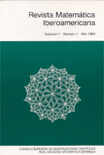
REVISTA MATEMATICA IBEROAMERICANA
Empowering scholars with open access to groundbreaking insights.REVISTA MATEMATICA IBEROAMERICANA, published by the EUROPEAN MATHEMATICAL SOCIETY, is a leading open-access journal dedicated to advancing the field of mathematics. Since its inception in 1996, the journal has provided a platform for high-quality research up to 2024, achieving a prestigious Q1 ranking in the miscellaneous mathematics category and placing it within the top 77th percentile of the Scopus rankings. Based in Spain, this journal fosters a vibrant academic community by disseminating innovative research, theoretical insights, and applications within the broad scope of mathematics. With its commitment to open access established in 2022, REVISTA MATEMATICA IBEROAMERICANA ensures that groundbreaking research is accessible to scholars, practitioners, and students worldwide, emphasizing the importance of collaboration and knowledge sharing in the mathematical sciences. The journal is a vital resource for anyone invested in the evolution of mathematics, providing a rich array of articles that contribute to both the theoretical and applied landscapes of the discipline.
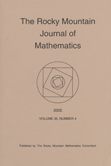
ROCKY MOUNTAIN JOURNAL OF MATHEMATICS
Navigating the Landscape of Mathematical DiscoveryROCKY MOUNTAIN JOURNAL OF MATHEMATICS, published by the Rocky Mountain Math Consortium, serves as a critical platform for researchers and practitioners in the field of mathematics since its inception in 1971. With a notable presence in the academic community, this journal covers a broad spectrum of mathematical disciplines, positioning itself in the Q2 category for Mathematics (miscellaneous) as of 2023. Despite being a subscription-based journal, it is recognized for its rigorous peer-review process and contributions to theoretical and applied mathematics, helping to advance knowledge and foster collaboration among mathematicians. The journal's ISSN number is 0035-7596 and its E-ISSN is 1945-3795, reflecting its commitment to accessibility and dissemination of high-quality research. Based in Tempe, Arizona, at Arizona State University, the journal continues to play an important role in shaping contemporary mathematical discourse through well-researched articles and innovative studies, aiming to bridge gaps between various mathematical subfields and engage a diverse audience, including students and established researchers alike.

Ukrainian Mathematical Journal
Advancing Mathematical Frontiers Since 1957The Ukrainian Mathematical Journal is a prominent academic publication in the field of mathematics, focusing on a diverse range of topics that appeal to researchers, professionals, and students alike. Published by Springer, this journal has been an important platform for disseminating significant mathematical research since its inception in 1957. With the aim of fostering knowledge and collaboration within the mathematical community, the journal curates high-quality articles that meet rigorous scholarly standards, evidenced by its Q3 ranking in the miscellaneous mathematics category for 2023. Although it currently does not offer open access, the journal remains accessible through various institutional subscriptions. It serves as a vital resource for ongoing discourse in the field and invites contributions that further advance mathematical understanding.
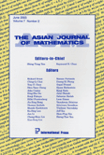
Asian Journal of Mathematics
Pioneering Insights in Mathematical DomainsAsian Journal of Mathematics, published by INT PRESS BOSTON, INC, is a premier scholarly journal dedicated to the expansive field of mathematics. With an ISSN of 1093-6106 and E-ISSN 1945-0036, it serves as a crucial platform for disseminating innovative research and methodologies in various mathematical domains. Established in 2005, the journal has garnered a significant reputation, currently holding Q2 rankings in both Applied Mathematics and Mathematics (miscellaneous) categories as of 2023. The journal aims to bridge theoretical research with practical application, making it an essential resource for researchers, professionals, and students seeking to advance their understanding and application of mathematical principles. Although it currently does not offer open access options, the journal's commitment to quality and rigor ensures its place as an influential reference within the mathematical community. Its office is located at PO BOX 43502, SOMERVILLE, MA 02143, United States, strategically positioning it as a key contributor to global mathematical discourse.
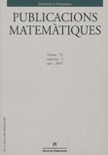
PUBLICACIONS MATEMATIQUES
Cultivating Excellence in Mathematical ScholarshipPUBLICACIONS MATEMATIQUES is a prestigious academic journal published by Universitat Autònoma de Barcelona, specializing in the diverse field of mathematics and its applications. With an esteemed Q1 ranking in Mathematics (miscellaneous) for 2023, this journal holds a significant position in the mathematical community, reflecting a commitment to high-quality research that spans both theoretical and practical aspects of mathematics. Although it operates without an Open Access model, it remains accessible to a global audience, featuring contributions that range from pure mathematical theories to interdisciplinary applications. Based in Spain, its influence and reach extend internationally, making it a vital resource for researchers, professionals, and students alike who seek to stay informed and engaged with cutting-edge developments in mathematics. The journal's continuous publication since 2002 further underscores its role in advancing mathematical research and fostering scholarly dialogue.
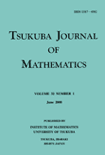
Tsukuba Journal of Mathematics
Cultivating a Community of Mathematical ExcellenceTsukuba Journal of Mathematics is a distinguished publication dedicated to advancing the field of mathematics through the dissemination of innovative research and comprehensive studies. Published by the University of Tsukuba, Department of Mathematics, this journal serves as a vital platform for mathematicians, researchers, and students to engage with cutting-edge mathematical theories and methodologies. Although currently not available as an open-access journal, it maintains a strong academic presence, contributing significantly to the global mathematical landscape. The journal invites submissions across various branches of mathematics, aiming to foster scholarly communication and collaboration. The ISSN 0387-4982 and the E-ISSN 2423-821X further establish its credibility and accessibility among the academic community, supporting its critical objective of facilitating high-quality research output. Situated in Tsukuba, Japan, a hub for scientific research and development, the Tsukuba Journal of Mathematics is committed to bridging gaps in mathematical knowledge and encouraging exploration of novel ideas.

RENDICONTI DEL SEMINARIO MATEMATICO DELLA UNIVERSITA DI PADOVA
Fostering a vibrant community of mathematical exploration and discovery.RENDICONTI DEL SEMINARIO MATEMATICO DELLA UNIVERSITA DI PADOVA, published by the European Mathematical Society, stands as a notable open-access journal with a rich history in disseminating research across various domains of mathematics. With an ISSN of 0041-8994 and E-ISSN 2240-2926, this journal has embraced open access since 2023, significantly enhancing its visibility and accessibility to a global audience. Situated in Germany, its publishing house is based at Technical University Berlin, which emphasizes its academic roots and dedication to fostering mathematical research. The journal features a quartile ranking of Q3 across multiple categories including Algebra and Number Theory, Analysis, Geometry and Topology, and Mathematical Physics as of 2023, indicating a vibrant contribution to the field, despite its challenge in specific rankings. Researchers, professionals, and students alike will find in this journal a platform for innovative ideas and significant findings that are crucial to the evolution of modern mathematics.

JOURNAL OF THE EUROPEAN MATHEMATICAL SOCIETY
Unveiling New Dimensions in MathematicsThe JOURNAL OF THE EUROPEAN MATHEMATICAL SOCIETY, published by the EUROPEAN MATHEMATICAL SOCIETY (EMS), stands as a premier platform in the field of mathematics, known for its rigorous editorial standards and impactful contributions to both applied and theoretical aspects of the discipline. With a commendable Q1 ranking in both Applied Mathematics and Miscellaneous Mathematics categories, alongside a Scopus rank of 32 out of 399 in General Mathematics, this journal has established itself as a crucial resource for researchers and professionals. Since achieving Open Access status in 2021, it has expanded its reach, making cutting-edge research more accessible to a global audience. With a publication horizon extending from 2002 to 2024 and a dedicated focus on high-quality mathematical scholarship, the journal continues to foster innovation and collaboration within the mathematical community.
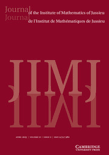
Journal of the Institute of Mathematics of Jussieu
Elevating the Standards of Mathematical ScholarshipJournal of the Institute of Mathematics of Jussieu, published by Cambridge University Press, is a leading academic journal that has established itself as a vital resource in the field of mathematics. With an impressive impact factor and a ranking in the top quartile (Q1) of miscellaneous mathematics, the journal serves as a platform for high-quality research from both established scholars and emerging researchers. Spanning from 2002 to 2024, the journal aims to foster collaboration and innovation in the mathematical community by publishing original research articles, reviews, and critical discussions on a wide range of mathematical topics. Although the journal does not offer open access, it remains widely accessible through various academic institutions and libraries, ensuring that critical advancements in mathematics are shared with a global audience. Located in the United Kingdom at the prestigious Cambridge campus, the journal reflects the rigorous standards of its publisher and the rich academic tradition of its home institution.